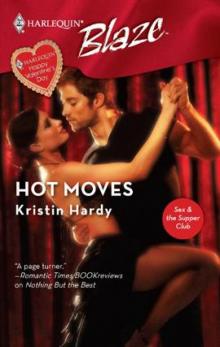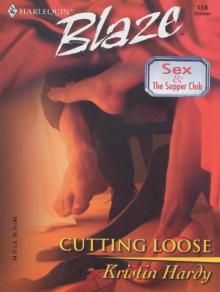- Home
- Kristin Hardy
The Chef's Choice Page 11
The Chef's Choice Read online
Page 11
“Dinner,” Max said firmly. “I want to check this guy out.”
Cady saw him as they turned the corner to Soleil, a little bistro tucked away in one of the old brick buildings down in the Old Port. He leaned against the wall by the door in his leather jacket, looking relaxed, dark and just a bit reckless. Then again, she felt just a bit reckless herself.
For a few steps, she watched him, admiring that gorgeous face, that long, lean body. Definitely out of her league, but she was going to go with it until whoever it was that pulled the levers in the universe realized there’d been a mistake and changed everything back.
And then he turned and their gazes locked and it was like the thump of power from an electrical shock jolting through her. Connection, more intense than it had ever been. Every step felt weighted with importance, every instant felt crystalline and shimmering.
“I guess you found it.” Her voice came out oddly breathless as they stopped before him.
“I guess I did,” he agreed.
“You could have gone inside.”
“I wanted to wait for you. Besides, I’m inside too much as it is. It’s nice to see the sun for a change. It’s nice to see you, too,” he added.
“Oh. Well.” She sounded like an idiot, Cady thought.
“I take it this is your sister?” He turned to Max. “Nice to meet you. I’m Damon Hurst.”
“I’m Max McBain,” she said, shaking his hand. “I’m also hungry.”
Damon grinned. “Then I guess we should go inside.”
The restaurant was narrow, the exposed brick walls hung with mirrors to make the space seem bigger than it was. Industrial heater vents trailed over the ceiling high above them. Pendant lamps in blue and red and green hung down low. In the open kitchen tucked in the back corner, the sounds of sizzling rose as white-capped chefs did magical things with fish and fowl, sending out scents that had Cady’s mouth watering.
“How was your trip to the restaurant supply store?” Cady asked as the waitress opened the wine. “Did you get your immersion circulator?”
“I did. We’ll be using it to make some of the food for your father’s party.”
“Ah, you’re the chef for that,” Max said.
“The assistant,” he corrected. “Roman, the sous chef, had a lot of the groundwork done already when I got here, and Cady can tell you, he’s a pretty good cook himself. I’m not going to come in and take over. I’m just pitching in where he asks me to.”
It was like him, Cady realized. For all that she’d heard about his ego, she’d never once seen it in evidence while he’d been at the Sextant.
“What are you guys making?” Max asked.
“Oh, lobster, pork chops with rosemary cider sauce, duck breast with blueberry coulis. Sorry—” his eyes glimmered at Cady “—no pizza. Although we did consider having cheese Danish for dessert.”
Max was used to being looked at by men. She was accustomed to capturing their full attention, whether she wanted it or not. As appetizers gave way to entrées, and on to dessert, she didn’t see what she’d feared. Oh, Damon was good company. He joked, made clever comments, asked all the right questions, but with every moment that passed, one thing was clear.
He had eyes only for Cady.
As for Max, he might as well have been talking to their brother, Walker. He was merely polite to their waitress, who was no slouch herself in the looks department.
And when Cady rose to go to the ladies’ room, he turned to watch her go.
Max’s smile widened. “What’s it like for you as a chef, going out to dinner? Is it a busman’s holiday?”
Damon glanced back over at her. “Even busmen have to eat.”
“So you’re not thinking about the food?”
“Oh, I’m always thinking about the food, no matter where I am, the same way Cady probably notices the plants. If I’m in a restaurant, I’m interested in their ingredients, I’m interested in their influences.”
“Do you ever take recipes back to your own place?”
“That’s like one artist trying to paint like another. I always want to take it in a different direction, even if I like the flavors. I thought their duck was good but I’d probably experiment around with adding some roasted poblano to the tomato coulis, get a hotter counterpoint to the sweet.”
“A hot tomato sauce?”
“Maybe. The idea is I do my own riff on it. Whatever I come up with won’t be a copy, it’ll be my interpretation.” He took a swallow of wine. “Then again, that’s really what cooking’s all about anyway. Like Marco Pierre White said, there’s nothing new under the sun, we’re all just refining what came before.”
“And is that what you’re doing here? Refining what came before?”
He leaned back and studied her. “Why do I get the idea we’re not talking about food anymore?”
“Interesting that you’d put that interpretation on it.”
Humor hovered at the corners of his mouth. “Is this the part where you start cracking your knuckles and telling me I better not mess with your sister?”
“I’d hope you know enough about my sister by now to know that she’s perfectly capable of cracking her own knuckles. I’ll just say she deserves you to be straight and she deserves the best you can give her.”
“I know enough about her by now to be sure of that, too.”
“Well, then—” Max tipped her head “—it appears we’re in agreement.”
Across the room, Cady approached.
“What are you two looking so serious about?” she asked, sliding into her chair.
Max locked eyes with Damon and smiled. “Hot tomatoes,” she said. “We’re talking about hot tomatoes.”
Chapter Eleven
“God, I love this time of year,” Cady said, stretching in the front seat of Damon’s car as they headed south from Portland toward Grace Harbor.
He glanced over and watched her just a beat too long. “Why’s that?”
“Oh, the sun’s out. The days last forever. You know summer’s coming but the mobs haven’t descended yet. The town still belongs to us.” The slanting rays of the setting sun felt warm on her skin.
“The mobs?”
“The summer people. You’ll see. How long does it take you to get into town from where you live?”
Damon moved his head. “I don’t know, fifteen, twenty minutes?”
“Plan for an hour when the season hits.”
“When’s that?”
“Fourth of July weekend, usually.”
“Not in June?” He changed lanes to pass a truck.
“Not warm enough yet,” she said. “But when July hits it’s something else. Grace Harbor turns into a whole different place when the out-of-towners show up.”
“You’re not big on out-of-towners, I take it.” His glance this time was sidelong, his eyes dark in the deepening dusk.
And she felt the little whisper of arousal. “That depends on the out-of-towner,” she said.
“Good to know.” He paused. “Why live in Grace Harbor, then? If it gets so crowded, why not go somewhere else?”
“Because it’s home,” she said simply. “Because, oh, I don’t know, because of the way the water looks in the morning when the sun comes up. Because of the way the air smells after it snows. Because I can look at the rhododendrons by the back porch and remember planting them with my dad when I was in third grade.”
He didn’t answer right away. “Sounds nice,” he said finally.
And was it her imagination or did she hear the faintest whisper of wistfulness in his voice? “So, where did you grow up?” She kept her voice casual.
“Pretty much everywhere. I was an Air Force brat,” he elaborated. “We’d lived in five states and two countries by the time I was ten.”
“Did you like moving around?”
“Would you?” He smiled humorlessly. “Ah, it wasn’t so bad while my mom was alive.”
While his mom was alive. “When did you lose her?”
“When I was twelve. Cancer,” he said in answer to her unspoken question. “She went pretty fast.”
Cady couldn’t imagine it. “I’m sorry,” she said softly and reached out to squeeze his hand.
“Thanks. It was a long time ago.”
“But you still miss her.”
“Yeah, I do.” His fingers tangled with hers. “You’re lucky to have your folks.”
“I know. But you have your dad, at least. So he was in the Air Force?”
“Still is, I guess.” Damon reached over to flick on the heat.
“You guess?” she asked.
“We haven’t talked in a while.”
“How long is a while?”
“How about not this century?”
She stared. “You haven’t talked to your father in eight years?” A people person she might not be, but it was impossible to imagine not talking to family.
Damon smiled faintly. “We’re not what you would call close.”
“Why’s that?”
“Let’s just say we had different ideas on who I should be. He wanted a private, not a son. The funny thing is, I probably wouldn’t have wound up being a chef if it weren’t for him.”
“He taught you to cook?”
“In a manner of speaking. I started trying to mess around in the kitchen after my mother died, mostly out of self-defense. It was either that or eat what my dad came up with, or MREs when he didn’t want to deal with it.”
“MREs?”
“Meals ready to eat. What they feed troops in the field.”
Twelve years old, she thought, no mother, a father who clearly didn’t give a damn. It squeezed her heart.
“Couldn’t you stay with relatives?”
“Her parents came from Yankee money, thought she’d married beneath her. My father figured we ought to be able to solve our own problems. And I wasn’t what you’d call a tractable kid.”
It had gotten full dark. The taillights of the cars ahead shone red. “How did you make the leap from home to a restaurant kitchen?” Cady asked. “Culinary school?”
“Kind of by accident, like a lot of cooks, I think. We were stationed in West Germany. I was about sixteen and I’d gotten into a…scrap, you might say. The colonel—”
“The colonel?”
“My father. He decided I needed to do something productive with my time, get a job. So I went to a local restaurant and convinced the chef to take me on. I basically chopped carrots, turned potatoes for a few hours after school.”
“I’m guessing that wasn’t exactly what your father had in mind.”
“Not exactly. On the other hand, I was under supervision and bringing home dinner. After a while, he got used to it. The funny thing was, a lot of what helped me survive in that kitchen I’d learned from him.”
“How to open MREs?”
He grinned. “How to tune out the flack and get the job done. The chef was from Alsace, just over the border. Maybe he was insulted that he had to cook in Germany, I don’t know. He was sure happy to thumb his nose at the German government and fake the papers I needed to work. The minute he got into the kitchen, though, he was an absolute madman. All the other prep cooks were terrified. If you didn’t chop the shallots or celery or the carrots to the exact millimeter, he’d throw it all across the room. Then you’d have to clean up and chop more of them to his standards and work extra hours because you’d been responsible for wasting food.”
“Sounds like a heck of a guy.”
Damon moved his shoulders. “He was just trying to teach us discipline. I only figured that part out later. It’s not so easy when you’re dealing with a pack of newbies like he was. Sometimes you just have to instill fear.” His mouth curved.
“Is that what you were doing when you yelled at your chefs on TV?”
“Sometimes. Everybody wants to be a star. Some of them had a tendency to showboat and screw things up.” The corners of his eyes crinkled. “Sometimes, we’d planned it in advance just for the drama. I already had the rep from Pommes de Terre. I figured I had to live up to it.”
“So to speak,” she said.
“So to speak. Besides, there’s something about a restaurant kitchen that brings out the crazy side of people. I don’t know if it’s the hours, or the pressure, or the workload, but it turns even reasonable people into screamers.”
“Now I know why I didn’t get to you back at the beginning.”
He turned to look at her and there was heat in his gaze. “Oh, you got to me, all right.”
And a slow tug of wanting began down low in her belly. They were driving down the open highway, Cady reminded herself. It took her two tries to speak. “So.” She licked her lips. “You were working for the screamer. What happened then?”
“You want more?”
She wanted everything.
“Well,” he continued, “I worked at the restaurant for a year and a half, every day after school. After a while, I learned. By the time I left, he’d made me weekend sous chef.”
“Not bad for a kid who was, what, seventeen?”
He nodded. “The day I turned eighteen, he sat me down in the dining room between lunch and dinner service and poured me a glass of claret. Told me he had a friend in Provence, a chef who would let me work in his kitchen. More important, the friend had contacts in half of the Michelin-starred restaurants in France. If I wanted to be a chef, all I had to do was ask.”
“What did your father say?”
Damon shrugged. “What could he say? I was over age, he couldn’t stop me.” He flicked on his blinker and got over to the right. They were at the Grace Harbor exit, Cady realized.
“I left and spent two and a half years working my way across France,” Damon went on, “learning everything I could. Then in Lyon, I lucked out and got a chance to work in Paul Descour’s kitchen. When he moved to New York to open a restaurant, I went with him.”
“And the rest is history,” she said lightly.
“History,” he reflected. “That makes it sound more important than it is.”
“It is important. The past is what makes you who you are.”
“I’m less interested in the past than I am in what happens next.” He pulled off onto the exit ramp. “The past might make you who you are, but it’s who you are that decides where you go.”
The car slowed and came to a stop, the roar of highway noise gradually fading away to the barely audible hum of the idling engine. A red light hung ahead of them in the darkness. Cady swallowed. “And where do you want to go?”
“Right now, somewhere quiet and alone with you.”
His words seemed to echo in the silence of the car. She could hear each separate beat of her heart. She knew that the choice was still hers, she had only to make it. And in making it, she would sever herself irreversibly from all that had come before.
She took a breath. “The light’s green,” she said.
Knowing that she wanted to do something and actually doing it were two very different things, Cady realized as they climbed the steps to the dark porch of her rental duplex. During the drive from the highway, the nerves had come back. Her fingers were clumsy as she fumbled with her keys.
The problem was that she didn’t know what to do. She didn’t know how to be with him. Above all things, she desperately wanted the sex to be good. She couldn’t bear for it to turn into a disappointment.
For either of them.
“No lights?” he asked, making her jump.
“I didn’t turn any on before I left. I thought I’d be coming home in daylight.”
“You could have somebody in here rifling the place.” He stepped in close behind her. “Good thing I’m here.”
“That’s right,” she said. “You could whisk them to death.”
“Careful,” he murmured in her ear. “You don’t want to underestimate me.”
It wasn’t possible, she thought as she opened the door and stepped inside. And as she flipped on the lights, she was more
aware of her every move than she ever had been before.
A generous person might have called her duplex compact. The furniture was well-worn, basic, although early-American garage sale might have been a more accurate description. The disorder was greater than it might have been if she’d had warning, but not much. It suited her just fine. Seeing it through Damon’s eyes, though, made her self-conscious.
Then again, she felt awkward in general. They both knew why they were there, they both knew what they wanted, and yet there was this breathless wait, this unaccountable distance. And he was making no move to bridge the gap.
Her stomach tightened. “You want something to drink?”
“Sure.”
Desperate to break the tension, Cady walked into her galley-style kitchen. “Not wine, I don’t have any.”
“That’s all right.” He followed her.
“I have Coke.” She opened the refrigerator. “And, uh, well, Coke.”
He pressed his lips to the back of her neck and she jolted.
“And, uh, water…”
He journeyed up to nibble her earlobe.
“And…”
“I don’t care about drinking.” He turned her to face him, closing the refrigerator door.
“What do you want—”
“You, right now,” he said, and pulled her to him.
In the midst of all the uncertainty, there was this between them, this connection, this immediacy, this thing that took her outside herself and made her a part of him, a part of what they made together. She’d worried about it all turning sour the way her other experiences had, but no kiss had ever carried her along like this.
And all of her self-consciousness melted away in the heat of his mouth. For it was impossible to be self-conscious when every fiber of her was busy being aware, busy feeling the press of his lips, the slick tease of his tongue, the delicious stroke of his hands down her body. He nibbled at her lips as though she were some exotic delicacy, inhaled her scent the way she’d seen him savor the aroma of a ripe pear at the market.
He pushed her jacket off her shoulders and let it drop to the floor, kept his mouth fused to hers as he shucked off his own. And then he pulled her to him, fit them together and she’d never imagined anything could feel so glorious.

 Always A Bridesmaid (Logan's Legacy Revisited)
Always A Bridesmaid (Logan's Legacy Revisited) Scoring
Scoring U.S. Male
U.S. Male Hot Moves
Hot Moves CUTTING LOOSE
CUTTING LOOSE Nothing but the Best
Nothing but the Best Under The Mistletoe (Holiday Hearts #2)
Under The Mistletoe (Holiday Hearts #2) Where There's Smoke (Holiday Hearts #1)
Where There's Smoke (Holiday Hearts #1) Certified Male
Certified Male TURN ME ON
TURN ME ON Her Christmas Surprise (Silhouette Special Edition)
Her Christmas Surprise (Silhouette Special Edition) A Fortune Wedding
A Fortune Wedding Under His Spell (Holiday Hearts #4)
Under His Spell (Holiday Hearts #4) Sealed With a Kiss
Sealed With a Kiss The Chef's Choice
The Chef's Choice My Sexiest Mistake
My Sexiest Mistake Bad Behavior
Bad Behavior Caught
Caught Slippery When Wet
Slippery When Wet Vermont Valentine (Holiday Hearts #3)
Vermont Valentine (Holiday Hearts #3)